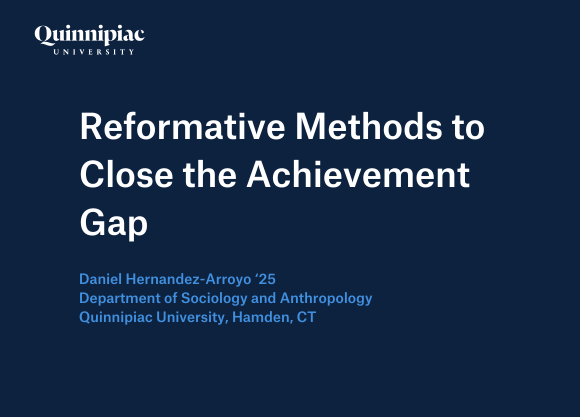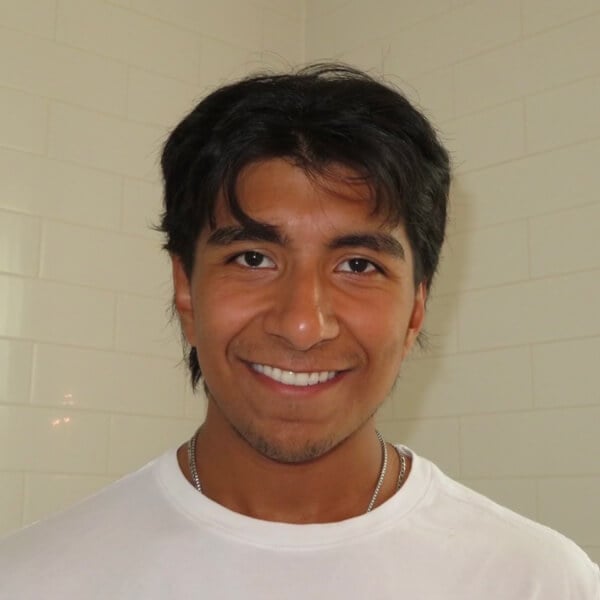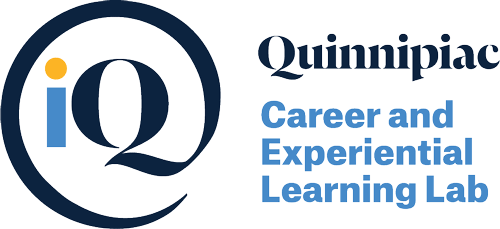Sociology
Reformative Methods to Close the Achievement Gap

Sociology
Reformative Methods to Close the Achievement Gap
Daniel Hernandez-Arroyo '25 planned out a new study to explore how peer-centered educational settings can affect student achievement in New York City public schools. This grant proposal was developed for the course SO 400: Senior Seminar.
Overview
This grant proposal aims to investigate how peer-centered approaches can improve students' academic performance and in-school behavior, ultimately contributing to closing the achievement gap in K-12 education across the United States. The project acknowledges that student outcomes are shaped by disparities in education related to race, socioeconomic status, and gender, which intersect with school environments and discipline policies. Existing research highlights three main themes influencing these disparities: identity, environment, and discipline. This research proposes to address the inefficient and unmethodical way the achievement gap is currently being narrowed by exploring a more effective strategy focused on student-to-student empowerment.
Researcher

Daniel Hernandez-Arroyo '25
Sociology
College of Arts & Sciences
Reformative Methods to Close the Achievement Gap
Project Summary
Research shows that achievement in K-12 education, including high standardized test scores, high graduation rates, and low discipline rates are correlated with positive teacher student relationships, social learning programs, and reformative discipline practices. However, no research has examined peer-centered approaches, where struggling students are placed in reformative environments alongside successful and positively influential peers.
Partnering with Restorative Justice Institute (RJI), I will explore how peer-centered educational settings can affect student achievement in New York City public schools. My research will help RJI develop teacher training programs to better serve students in the NYC public school system.
Researcher Bio
My name is Daniel Hernandez-Arroyo and I am a senior Sociology major. My qualifications from Quinnipiac University involve Research Methods, instructed by Xi Chen, and Polling/Opinion Seminar, instructed by Scott McLean. The first course taught me how to conduct sociological research, giving me positive habits, skills, and tools that I've applied to future opportunities. The polling course involved rigorous application of these practices, providing me with a high-quality experience in conducting research.
I have completed qualified research at Farver & Heffernan Law Firm, where I used programs like LexisNexis and CTbar to research criminal law, which will translate to the skills necessary to produce a professional policy initiative.
Literature Review
Educational disparities in the U.S. create an achievement gap shaped by race, socioeconomic status, and gender. Marginalized students, especially Black and low-income students, face biased discipline, due to:
- Disciplinary choices of the school or individual teacher
- Limited support for social learning programs
- Environmental factors outside of school
Solutions include student-centered policies, cultural appreciation, and improved teacher training. Addressing bias and resource inequality can create equitable schools and help close the achievement gap.
Research Plan
Research Question: How do students and teachers experience peer-centered approaches to students’ academic performance and in-school behavior?
Independent variable: Peer-centered approaches are progressive discipline methods, teacher training, social-learning programs
Dependent Variables: Academic performance and in-school behavior refers to achievement scores and graduation rates.
I will interview 30 students and 30 teachers from various NYC public schools. I will ask about academic performance as well as various types of in-school behaviors.
Ethical issues of participants' informed consent, participants' voluntary participation, and participant’s confidentiality have been taken into consideration.
Timeline
Phase I (September 2026): Recruit students and teachers.
Phase II (October 2026 – February 2027): Interview students and teachers.
Phase III (March 2027 – May 2027): Analyze interview data.
Phase IV (June 2027): Write preliminary report; submit report to RJI for feedback.
Phase V (July 2027): Revise report based on feedback; submit final report to RJI.
Partner Organization
RJI is an organization in NY that seeks to restore school justice practices through training and resources for progressive disciplinary methods.
My research builds on RJI’s mission to create school communities that respond to negative discipline, applying it to a hypothesis for improving social inclusion. If peer support increases student engagement, then involving more students will likely increase program participation.
Budget
| Travel Costs | Monthly unlimited Metro Card x 2 | $294 |
| Remuneration for Teachers and Students | $20 Gift cards for teachers, $10 gift cards for students | $900 |
| Transportation Costs | $20/hr | $4800 |
| Total | $5964 |
Professional Application
"This project prepared me for law school and the goal of a career in educational policy by sharpening my sociological research skills and data gathering skills through interviews focused on educational disparities. Working with the Restorative Justice Initiative (RJI) provided policy analysis experience. Data analysis, report writing, and presentations enhanced my ability to communicate policy recommendations, building on prior legal research." - Daniel Hernandez-Arroyo '25
For Further Discussion
This serves as an overview of the project and does not include the complete work. To further discuss this project, please email Daniel Hernandez-Arroyo.
Course Overview
SO 400: Senior Seminar is designed as the capstone course for students majoring in sociology and gerontology. Students research a sociological or aging-related topic of their choosing and write a thesis based on their work. All senior theses represent a culmination of majors' academic experiences in the department.
Explore Our Areas of Interest
We've sorted each of our undergraduate, graduate and doctoral programs into unique Areas of Interest. Explore these categories to discover which programs and delivery methods best align with your educational and career goals.
Explore Humanities and Culture at Quinnipiac
Explore Social Sciences at Quinnipiac
References
Vega, Desireé, James L. Moore III, and Antoinette H. Miranda. 2015. "In Their Own Words: Perceived Barriers to Achievement by African American and Latino High School Students." American Secondary Education 43(3):36-59. https://www.jstor.org/stable/43694217.
Rhoden, Stuart. 2017. “Trust Me, You Are Going to College”: How Trust Influences Academic Achievement in Black Males. The Journal of Negro Education 86(1):52–64. https://www.jstor.org/stable/10.7709/jnegroeducation.86.1.0052.
Ford Jr., J. M., Jones, M. H., & Alexander, J. M. (2015). After-School Interests, Achievement Goal Orientation, and Peers in a Predominantly African American School. The Journal of Negro Education, 84(4), 547-563. https://doi.org/10.7709/jnegroeducation.84.4.0547.
